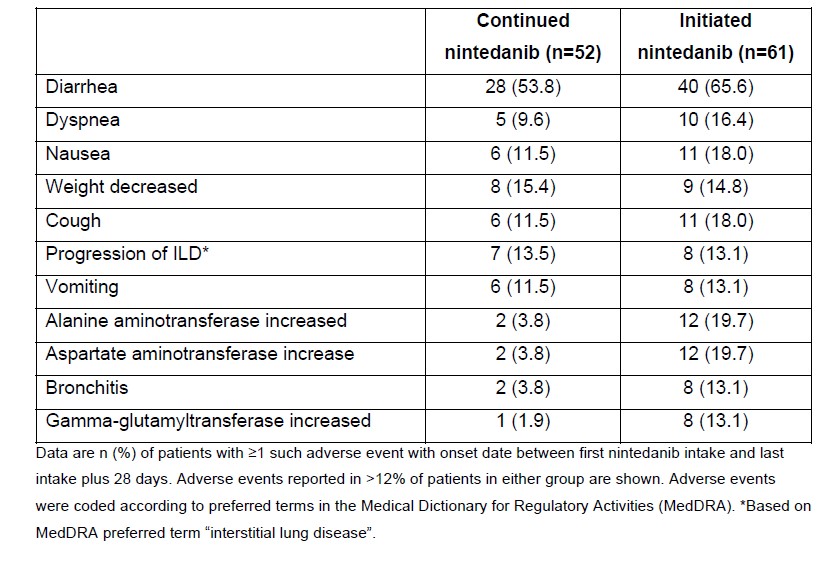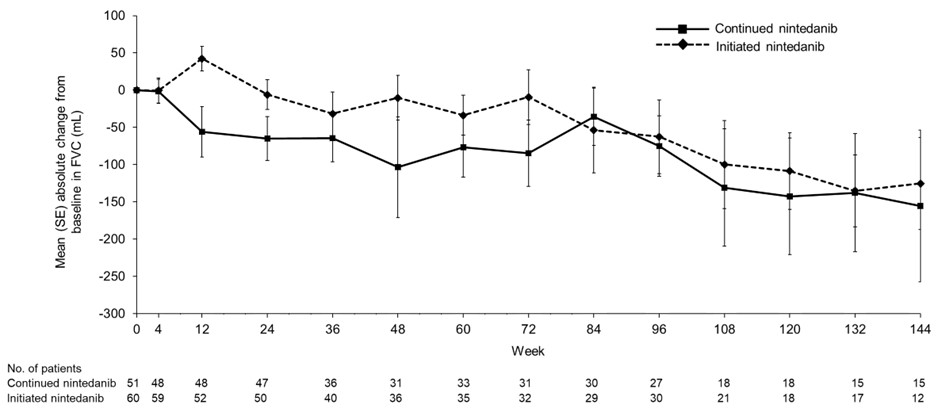Session Information
Session Type: Poster Session C
Session Time: 9:00AM-11:00AM
Background/Purpose: In the INBUILD trial in patients with progressive pulmonary fibrosis, nintedanib reduced the rate of decline in forced vital capacity (FVC) compared with placebo, with a safety profile characterized predominantly by gastrointestinal events. The open-label extension of the INBUILD trial, INBUILD-ON, collected data on adverse events and FVC decline over longer-term treatment with nintedanib. We analyzed data from patients with progressive pulmonary fibrosis related to autoimmune disease in INBUILD-ON.
Methods: Patients in the INBUILD trial had diffuse fibrosing interstitial lung disease (ILD) (reticular abnormality with traction bronchiectasis, with or without honeycombing) of >10% extent on HRCT and met criteria for progression of ILD within the prior 24 months, despite management deemed appropriate in clinical practice. Patients who completed the INBUILD trial on treatment were eligible to enter INBUILD-ON. Patients who received nintedanib in INBUILD and continued to take it in INBUILD-ON comprised the “continued nintedanib” group. Patients who received placebo in INBUILD and initiated nintedanib in INBUILD-ON comprised the “initiated nintedanib” group. In descriptive analyses, we analyzed adverse events and changes in FVC in patients with autoimmune disease-related ILDs. Median exposure to nintedanib in INBUILD-ON in these patients was 21.8 months.
Results: Of the 434 patients treated in INBUILD-ON, 113 had autoimmune diseases (52 rheumatoid arthritis, 29 systemic sclerosis, 13 mixed connective tissue disease, 19 other diseases). Of these patients, 66.4% received ≥1 disease-modifying anti-rheumatic drug or high-dose glucocorticoid ( >20 mg/day prednisone or equivalent) at baseline or during the trial. Diarrhea was the most frequently reported adverse event (Table). Serious adverse events were reported in 27 (51.9%) patients in the continued nintedanib group and 37 (60.7%) patients in the initiated nintedanib group. In the continued and initiated nintedanib groups, respectively, 10 (19.2%) and 31 (50.8%) patients had ≥1 dose reduction and 15 (28.8%) and 28 (45.9%) patients had ≥1 treatment interruption. Adverse events led to discontinuation of nintedanib in 17 (32.7%) patients in the continued nintedanib group and 28 (45.9%) patients in the initiated nintedanib group. Mean (SE) changes in FVC from baseline to week 144 of INBUILD-ON were −155.3 (101.8) mL in the continued nintedanib group and −125.2 (61.6) mL in the initiated nintedanib group (Figure).
Conclusion: The adverse event profile of nintedanib in patients with progressive pulmonary fibrosis due to autoimmune disease in INBUILD-ON was consistent with that observed in patients with autoimmune diseases in the INBUILD trial. Permanent discontinuations of nintedanib were less frequent in patients who continued nintedanib in INBUILD-ON than in those who initiated nintedanib in INBUILD-ON. These data should be interpreted with caution given the small number of patients who provided data, particularly at the later time-points.
To cite this abstract in AMA style:
Matteson E, Antin-Ozerkis D, Bonella F, Chaudhuri N, Cottin V, Mueller H, Sambevski S, Wuyts W. Continued Nintedanib Treatment in Patients with Progressive Pulmonary Fibrosis Related to Autoimmune Disease: Data from INBUILD-ON [abstract]. Arthritis Rheumatol. 2023; 75 (suppl 9). https://acrabstracts.org/abstract/continued-nintedanib-treatment-in-patients-with-progressive-pulmonary-fibrosis-related-to-autoimmune-disease-data-from-inbuild-on/. Accessed .« Back to ACR Convergence 2023
ACR Meeting Abstracts - https://acrabstracts.org/abstract/continued-nintedanib-treatment-in-patients-with-progressive-pulmonary-fibrosis-related-to-autoimmune-disease-data-from-inbuild-on/


